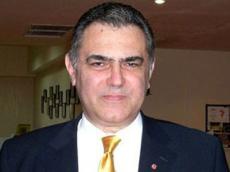Today.Az » Politics » Dennis Sammut: EU needs Azerbaijan as a partner in its energy security - INTERVIEW
12 December 2013 [10:14] - Today.Az
 Interview with Dennis Sammut, executive director of the British organization LINKS
Interview with Dennis Sammut, executive director of the British organization LINKS
- As 2013 comes to an end, it is time to make conclusions. First of all, how would you estimate the results of the Eastern Partnership summit in Vilnius for future relations between the EU and the three states of South Caucasus?
The summit was important for a number of reasons. It highlighted the committment of the European Union towards its eastern neighbours. It exposed, in very stark terms, Russia’s opposition to closer relations between the EU and the former Soviet republics. Many suspected this. Vilnius made it clear for everybody to see. In the future the EU will have no choice but to respond to Russia’s lack of sensitivity and friendship..
As for the three South Caucasus countries we have a new situation now. Georgia has initialled an association agreement, and will sign it next year. EU engagement and support for Georgia will increase in the coming years.All the ingredients are now in place for EU-Georgia relations to develop very positively and dynamically.
Armenia has now closed the door completely on a formal relationship with the EU. There needs to be a process for defining future relations, but the big idea that underpinned the work that has been done in past four years has gone.
Azerbaijan remains somewhere in the middle. As an energy exporting country it has some options of flexibility, but there is a limit to this flexibility too. As has been said before Azerbaijan needs the EU as a partner in its plans to modernise and develop; the EU needs Azerbaijan as a partner in its energy security. There is therefore a basis on which the co-operation can be built – but the two sides have not quite found it yet.
- Meanwhile, don't you think that the European Union, in turn, is not paying enough attention to our region, despite the European’s having big interests here?
I would not agree that the EU is not paying attention. Over the last five years particularly, much work has been done and even the mechanisms necessary are now in place. However one of the lessons from Vilnius is that the relationship cannot be just about economics. There has to be a solid political basis for relations to endure the harsh geo-political realities of the region. I think we will see more, and more focused, EU political engagegement with the region in the future, and much more plain talking to Russia. We are already seeing this with regards to Ukraine. Russian Foreign Minister Lavrov described it as European hysteria. I suspect he needs to get used to it.
- How was 2013 for the Karabakh conflict settlement? I mean there were some optimistic signs in the recent meeting between two Presidents and the joint statement of co-chair countries and Foreign Chiefs of Azerbaijan and Armenia.
Well lets be frank, the first ten months of the year were wasted. The Vienna meeting of the two presidents in November was however a positive step forward. Two things are required at this stage: momentum needs to be maintained, and the discussions need to move from the general to the tangible.The process has a credibility problem based on the experience of the past. Nobody is going to be very excited by another carefully worded diplomatic statement. People need to see something tangible happening on the ground. I think everybody understands this now, which gives me some hope.
- Turkish side disseminated information about some kind of plan agreed with Armenia for withdrawal of troops from two occupied regions around Nagorno Karabakh? How much can that scenario be closer to reality?
There are many ideas being discussed, and certainly this idea is on the table. There are others. A change in the situation on the ground is now necessary for the very credibility of the negotiations.
- By the way, the Turkish Foreign Ministry also stated about its intentions to work on two directions to stabilize relations in the region: improvement of Turkish-Armenian and Azerbaijan-Armenian relations. What do you think about the prospects of this policy? And do you share optimism of some experts on possible upcoming meeting between Foreign Ministers of Turkey and Armenia in Yerevan?
Turkish-Armenian relations are complicated by the heavy baggage of history. Karabakh and Armenian-Azerbaijani relations are simply one facet of these relations. Much work needs to be done for these relations to be established on a good basis. The two strands you mention are obviously different, but equally obviously not entirely disconnected. Both need to be managed simultaneously but we cannot expect progress in both at exactly the same pace. Other factors influence the two issues which makes this difficult, if not impossible to achieve. There therfore needs to be some leeway for flexibility by everybody concerned.
I think the visit of Foreign Minister A.Davitoglu to Yerevan to attend a BSEC meeting is a positive sign, and should be welcomed. We should not expect dramatic results from the visit, but again a positive step.
/Day.Az/
|
|